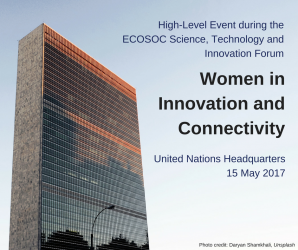Ecsite Executive Director spoke at a High-Level Event entitled "Women in Innovation and Connectivity: The Role of the Private Sector", organised during the ECOSOC Science, Technology and Innovation Forum earlier today at the New York UN headquarters.
Ecsite Executive Director Catherine Franche delivered a speech entitled "No One Left Out: Inspiring Future Innovators in Non-Formal Settings".
Starting with three women portraits from the "Beyond the Lab: the DIY revolution" exhibition developed by the Science Museum London for the Sparks project, she praised these "new types of women entrepreneurs using technology to take control of the quality of their life or of others".
"Entrepreneurship begins with ownership," she stated, "It begins with empowerment, or developing a personal power to be creative, to lead teams, to communicate your concept to stakeholders, the power to use various technologies to collect, analyse, and share data." "Where can women acquire these powers?," she continued. "In science centres and museums, these "trusted incubators for social change". In bottom-up hackathons, stakeholders dialogues, maker spaces or citizen science projects, "where women have more freedom to define their own social roles".
Franche quoted the PlayDecide game, used by thousands of science engagement initiatives; the "reverse science cafés" organised by the Copernicus science centre in Warsaw that took the risk of "gathering a young doctor, a child psychologist, the director of a corporation and a technological expert to discuss the problems of new technologies in medicine"; the entrepreneurship programme run by Teknikens Hus in Sweden; the Expect Everything campaign that brings teenage girls to STEM careers (Hypatia project).
"Tomorrow’s entrepreneur will never be lonely," Franche continued. "She will be working with many people, scientists and non-scientists, involved in co-design and co-creation, she will join citizens’ science projects where collective data will radically speed up the scientific process. Here again, science museums are hubs that integrate these new societal processes."
"The SDGs don’t belong to the UN, they are everyone’s affair," she stated, before sharing three recommendations as a conclusion:
"1) Develop inclusive innovation ecosystems that integrate non-formal settings such as science museums and other science engagement organisations, as well as non-traditional practices such as DIY and multistakeholders co-creation processes.
2) Recognize that empowerment is crucial to entrepreneurship. Develop the capacities and cooperate with organisations that already have a lead on science engagement.
3) Start early and don’t stop. Empower girls, teens, young and adult women."
In thanking the Ecsite Executive Director for her intervention, the event moderator Chantal Line Carpentier, Chief of UNCTAD Office in New York commented that she originally hadn't thought of museums a potential partners to work with towards the SDGs - it sounds like they're now on the map.
The event was run by the Royal Academy of Science International Trust, in close collaboration with the Ministry of Social Dialogue Consumer Affairs and Civil Liberties of the Republic of Malta, The United Nations Conference on Trade and Development (UNCTAD) and the Permanent Mission of the Principality of Andorra to the United Nations.




